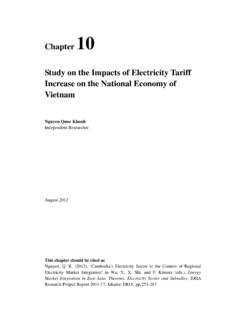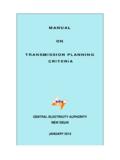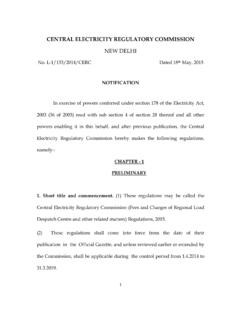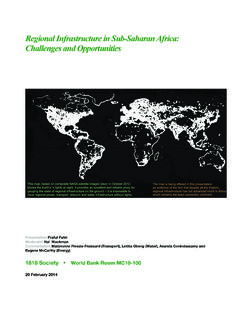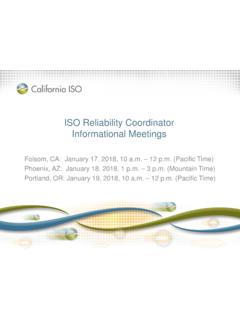Transcription of GUIDELINES ON THE GOVERNANCE OF STATE-OWNED …
1 GUIDELINES ON THE GOVERNANCE OF STATE-OWNED ENTERPRISES FOR southern africa NOVEMBER 2014 2 ABOUT THE OECD- southern africa NETWORK ON THE GOVERNANCE OF STATE-OWNED ENTERPRISES The OECD- southern africa Network on the GOVERNANCE of STATE-OWNED Enterprises (SOEs) (hereafter SOE Network for southern africa ) is a forum aimed at improving the corporate GOVERNANCE of SOEs, and which provides a forum for regional dialogue and co-operation. It is the first initiative of its kind to focus on SOE GOVERNANCE and mainly covers the member economies of the southern africa Development Community (SADC).
2 The forum was launched in 2007 to support regional and national reformers in their efforts to improve the performance of SOEs. Participating institutions represent entities which manage portfolios of SOEs or which oversee government policy vis- -vis SOEs. Representatives from stakeholder institutions, regional and international organisations, development banks, and corporate GOVERNANCE practitioners participate to the Network. ABOUT THE OECD The OECD is a unique forum where governments work together to address the economic, social and environmental challenges of globalisation.
3 The OECD is also at the forefront of efforts to understand and to help governments respond to developments and concerns such as corporate GOVERNANCE practices, the information economy and recommend policies designed to improve the quality of people's lives. The Organisation provides a setting where governments can compare policy experiences, seek answers to common problems, identify good practice and work to co-ordinate domestic and international policies. ABOUT THIS PUBLICATION This document represents a shared regional consensus on SOE reform priorities by members of the SOE Network for southern africa .
4 The GUIDELINES are the shared property of Network participants and are offered as a tool to the SADC community. The GUIDELINES can be endorsed by members who wish to formally associate themselves with them. This document was developed by a regional Taskforce, with input from the Network and broader public through a year-long consultation process. The Guidance was formally launched at the 5th meeting of the Network which took place in Lusaka, Zambia on 26-27 November 2014. This work is published on the responsibility of the Secretary-General of the OECD.
5 The opinions expressed and arguments employed herein do not necessarily reflect the official views of OECD member countries. This document and any map included herein are without prejudice to the status of or sovereignty over any territory, to the delimitation of international frontiers and boundaries and to the name of any territory, city or area. 3 TABLE OF CONTENTS PREAMBLE .. 4 I. AN EFFECTIVE LEGAL AND REGULATORY FRAMEWORK FOR STATE-OWNED ENTERPRISES .. 6 II. THE STATE ACTING AS AN OWNER.
6 10 III. EQUITABLE TREATMENT OF SHAREHOLDERS AND OTHER OUTSIDE INVESTORS .. 15 IV. CORPORATE ETHICS AND STAKEHOLDER RELATIONS .. 20 V. TRANSPARENCY AND DISCLOSURE .. 24 VI. THE BOARD OF DIRECTORS .. 28 4 PREAMBLE The GUIDELINES on the GOVERNANCE of STATE-OWNED Enterprises for southern africa ( the GUIDELINES ) represent a shared regional consensus on STATE-OWNED enterprise (SOE) reform priorities. regional SOE GUIDELINES can help governments assess and improve the way they exercise the ownership function, and are can be used as a tool from which to draw and adapt national ownership and GOVERNANCE practices.
7 Good practices ultimately serve to improve the GOVERNANCE and performance of SOEs, and promote competitive, transparent and more efficiently-run enterprises. These GUIDELINES are intended to capture the regional aspirations and priorities of SOE GOVERNANCE reformers across the southern africa region. The benefit of a regional approach is that it is reinforced by a shared history and commonality in terms of the countries development paths. Adopting a regional approach to corporate GOVERNANCE can also help achieve regional integration goals.
8 Introduction SOEs form one of the largest sectors of the economy in many African countries, and are important contributors to national development. SOEs provide citizens with access to vital services such as water, electricity, health, sanitation, telecommunications, and transportation. The competitive position of the private sector-led economy, including small and medium-sized enterprises, is also heavily dependent on the services and infrastructure provided by these firms. On a regional level, SOEs are key players in large cross-border infrastructure projects, which are crucial to realising regional integration goals and to achieving what is considered to be an important development objective.
9 Many southern African economies have placed SOEs at the centre of their national development strategies with a growing trend to rely on SOEs to remedy market failures and remove direct obstacles to development. Some go beyond this and aspire to a developmental state model in which SOEs drive competitiveness, job creation and industrial development. This is partially a response to disappointment with the outcomes of privatisations and structural reform programmes in the 1990s, but there is also a growing consensus that if governed properly, SOEs can support national development.
10 Some concerns have been expressed regarding the effectiveness of these approaches, including the managerial and technical capabilities of the participating SOEs. Irregular practices including conflicts of interest and outright corruption have also been alleged. Thus, there is a need for strong efforts to ramp up the efficiency, competitiveness and commercial viability of existing SOEs. Until now, no southern African regional benchmark for SOE GOVERNANCE has been developed. However a small number of national SOE corporate GOVERNANCE GUIDELINES do exist.












